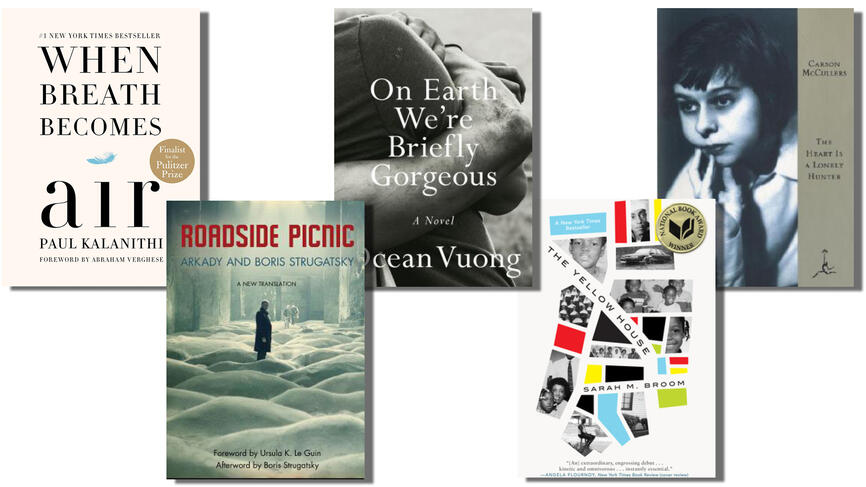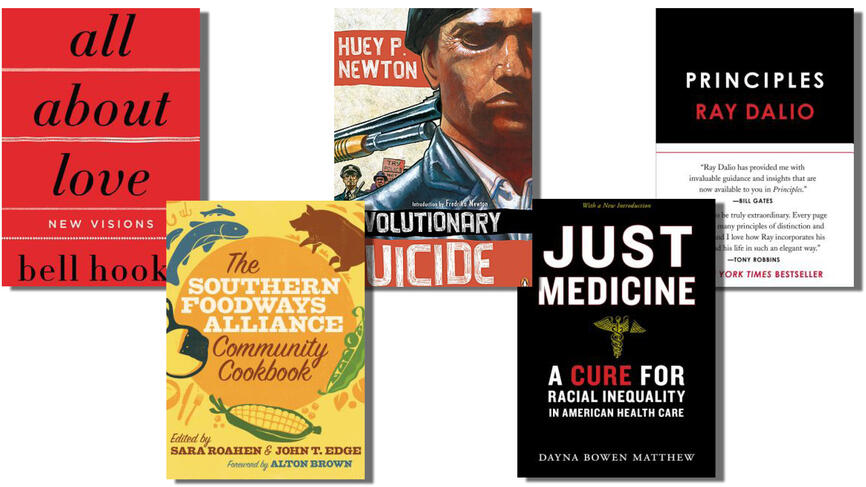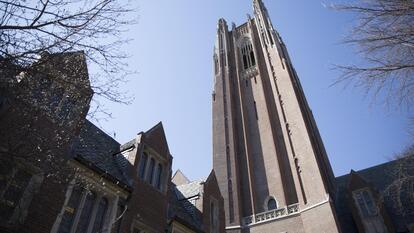What Wellesley Students Are Reading During a Summer Like No Other
As Wellesley students prepare to return to classes, both on campus and remotely, we caught up with some of them to hear what they have been reading during this unprecedented summer marked by a pandemic and protests. This is the final book roundup in a series that has already highlighted books by alumnae authors of color and faculty and staff selections.

Udita Bajaj ’22, When Breath Becomes Air, Paul Kalanithi
“So what tense am I living in now?” This is a quote from When Breath Becomes Air by Paul Kalanithi. I repeated this to myself when I read it and reflected on our lives in this changed world. I realized that so many of us are living in the memories of the past and the things we did and are waiting and hoping for the future and the things we would do. What about what we can do now? This memoir gave me hope for the present and all we can do to better our lives and that of others, because believe me, there is so much.
Fatima Djalalova ’24, Roadside Picnic by Arkady and Boris Strugatsky
One of the books that has captured my thoughts lately is the Roadside Picnic by Arkady and Boris Strugatsky. In this Soviet science fiction, the government and scientists try to stabilize the life of a small town after it gets disturbed by deadly artifacts left from alien visitors. For me, the way characters proceeded to deal with the unknown mirrored not only the current pandemic, but also the relationship with history. A journey toward understanding history might be painful just like those artifacts, but nevertheless vital for moving forward.
Mariela Duran ’23, On Earth We’re Briefly Gorgeous, Ocean Vuong
This summer, I decided to pick up Ocean Vuong’s debut novel, On Earth We’re Briefly Gorgeous, after reading his poetry collection Night Sky with Exit Wounds in my first-year writing course. This novel is written as a letter from the main character, Little Dog, to his mother, who can’t read. From a rice farm in Vietnam to a nail salon in Hartford, Vuong untangles a complicated family history rooted in the Vietnam War. Amid COVID-19, BLM protests, and an upcoming election, we are seeing history seep into our own experiences and memories. Little Dog’s story resonated with me because it’s about a young person finding their place in a tumultuous world.
Isabel Flessas ’24, The Yellow House, Sarah M. Broom
In this book, which won the 2019 National Book Award for nonfiction, Broom describes coming of age in New Orleans-East while living in tight quarters with her 11 siblings. As hard times, such as Hurricane Katrina, repeatedly strike the Broom household, the depth of the inequality Broom faces becomes jarringly clear. This book really resonates right now because it highlights the massive inequalities African Americans face in contemporary America, especially in regard to their chase of the mythic “American dream.” For instance, Broom finds success in her career but still must learn to come to terms with her poor upbringing while watching her siblings succumb to the same institutionally driven poverty she faces. The Yellow House has given me, a white woman, a better look at how deeply racial biases and the cycle of poverty affect African Americans.
Ky Fuller ’21, The Heart Is a Lonely Hunter, Carson McCullers
Quarantined at home for another Georgia summer, I found myself leafing through Carson McCullers’ The Heart Is a Lonely Hunter once again. McCullers’ novel follows five people in a Depression-era Georgia town. As police brutality, economic injustice, and social isolation continue to intensify, Lonely Hunter resonates with me as a cautionary tale. McCullers frames the loneliness that pervades her novel not as a product of some natural, universal human condition, but as the grotesque result of the racism, poverty, misogyny, and egotism that prevents her characters from meaningfully connecting with one another, much less joining together for a common cause. McCullers, a white woman writing for a majority white audience, used her privilege to implore her readers to learn from her characters’ mistakes. To practice empathy. To listen more than they speak. To use their voices not for themselves, but for the less privileged, and to place others’ needs before their own. By getting outside ourselves, seeing ourselves as a parts of a greater social structure, McCullers suggests that we find completion together, not alone.

Nia Goodridge ’21, All About Love: New Visions, bell hooks
bell hooks’ incisive All About Love: New Visions is a bold protest against a nation and a world sinking into a permanent state of lovelessness. All About Love is concerned with the true meaning, theory, and practice of love—a love that goes beyond romance and extends to all of humanity. Today, we are a country plagued by division. Yet, hooks and I believe that love and its healing are our destiny. To heal, we must have hope in a better future and practice courage. Let this book be a guiding light in doing so.
Emily Martin ’21, The Southern Foodways Alliance Community Cookbook, Sara Roahen and John T. Edge
I’ve been spending a lot of time reading through the local community cookbooks from the 1970s and ’80s that my family has on our bookshelves. I rarely cook with them, but I think there’s a lot we can learn by critically examining our own “culinary histories” and thinking about the underrecognized communities that have shaped especially Southern foodways. For example, what does it mean that so many Southern cookbooks are written by white authors? I think confronting inequities in our food system starts with understanding what’s on our bookshelves and our plates.
Olivia Massie ’22, Revolutionary Suicide, Huey P. Newton
This summer I returned to one of the books that first spoke to me, Revolutionary Suicide by Huey P. Newton, the revolutionary comrade and co-founder of the Black Panther Party. Newton writes, “revolutionary suicide does not mean that I and my comrades have a death wish; it means just the opposite. We have such a strong desire to live with hope and human dignity that existence without them is impossible.” This was a sentiment I felt when I first read his book and one that I still continue to feel deeply. Newton, among others like Kwame Ture, Jamil Abdullah Al-Amin, Assata Shakur, the Combahee River Collective, Frantz Fanon, Malcolm X, June Jordan, Audre Lorde, George Jackson, and Amílcar Cabral, are people who I continue to turn back to and read and learn from. Right now there is tremendous energy directed against the state and the violence it sanctions against Black, Brown, and Indigenous people here and across the globe. It is my hope that this energy endures and perseveres till the day we see the death of anti-Black racism, capitalism, colonialism, imperialism, and the U.S. empire.
Helen Redmond ’21, Just Medicine: A Cure for Racial Inequality in American Health Care, Dayna Bowen Matthew
In Just Medicine: A Cure for Racial Inequality in American Health Care, Dayna Bowen Matthew cites an extensive body of research to argue that doctors’ unconscious biases cause them to deliver lower-quality care for patients of color. This book resonates with me because it presents an innovative solution to racial discrimination in health care. Matthew notes that people can be trained to avoid acting on unconscious biases. Therefore, she suggests reforming the Civil Rights Act of 1964 to hold hospitals accountable for failing to take steps to reduce physicians’ unconscious biases. Just Medicine reminds its readers of the severity of health care discrimination and provides a hopeful call to action to counter implicit racism.
Melody Umoren ’21, Principles, Ray Dalio
As a first-generation college student and a child of immigrants, navigating college and careers has proven to be challenging. In spite of this, I have turned to personal-development books such as Ray Dalio’s Principles as a source of cultural capital. My favorite principle is “Embrace Reality and Deal With It.” I have found this principle useful as a humanities major going into the financial services industry. Dalio’s principles provide direction for people of all walks of life, as his commentary on life and business will be invaluable to anyone reading this amazing book.



